|
|
|
Sort Order |
|
|
|
Items / Page
|
|
|
|
|
|
|
| Srl | Item |
| 1 |
ID:
152454
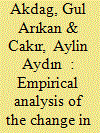

|
|
|
|
|
| Summary/Abstract |
The existing literature on Turkish foreign policy (TFP) asserts that under the rule of the Adalet ve Kalkınma Partisi (AKP), Turkey’s foreign policy shifted from caution and uni-dimensionality to relative activism and multi-dimensionality. This study aims to test these arguments through a systematic analysis of the international agreements ratified by the Turkish Parliament between 1984 and 2015. By looking at the number, content and signatory parties of these international agreements, it aims to empirically show the change in the activism, orientation and instruments of TFP. Using this original data set is not only used to trace the change under the AKP but also across all ruling governments that came to power between 1984 and 2015.
|
|
|
|
|
|
|
|
|
|
|
|
|
|
|
|
| 2 |
ID:
152447
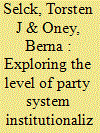

|
|
|
|
|
| Summary/Abstract |
This article offers an analysis of the level of post-1980 Turkish party system institutionalization (PSI) and party system type. Although Turkey shares characteristics with both established and new democracies, no research has compared Turkey to both the established and new democracies with regard to PSI. Utilizing Croissant and Völkel’s four-dimensional index of PSI and Siaroff’s typology of party system type, this article shows that the level of Turkish PSI is higher than that of new democracies. The Turkish party system has not been fully institutionalized yet; however, the dominant party system introduces a certain degree of stability and predictability.
|
|
|
|
|
|
|
|
|
|
|
|
|
|
|
|
| 3 |
ID:
152449
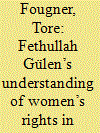

|
|
|
|
|
| Summary/Abstract |
This article examines the gender views of Islamist preacher Fethullah Gülen, a citizen of Turkey who has not only risen to global prominence since the early-2000s, but also gained a reputation for having ‘progressive’ views on the status of women in Islam. Considering Gülen’s writings on women’s identity, the relationship between men and women, and the role of women in public life, the article establishes that Gülen is more accurately depicted as deeply conservative with respect to women’s rights and gender equality. Furthermore, it identifies instances of tension between nature and nurture in Gülen’s conception of men and women, and locates his insistence on women naturally being of a subordinate kind within his sociopolitical project of creating an Islamic society.
|
|
|
|
|
|
|
|
|
|
|
|
|
|
|
|
| 4 |
ID:
152451
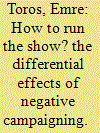

|
|
|
|
|
| Summary/Abstract |
Although the academic literature on negative campaigning is growing, more research is needed to contribute to the theoretical and empirical knowledge on the phenomenon. Accordingly, this article examines the impact of negative political messages on political trust in Turkey. The findings indicate that although exposure to negativity alters the trust level of the citizens, this impact is not uniform and dependent on party identifications.
|
|
|
|
|
|
|
|
|
|
|
|
|
|
|
|
| 5 |
ID:
152452
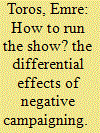

|
|
|
|
|
| Summary/Abstract |
Although the academic literature on negative campaigning is growing, more research is needed to contribute to the theoretical and empirical knowledge on the phenomenon. Accordingly, this article examines the impact of negative political messages on political trust in Turkey. The findings indicate that although exposure to negativity alters the trust level of the citizens, this impact is not uniform and dependent on party identifications.
|
|
|
|
|
|
|
|
|
|
|
|
|
|
|
|
| 6 |
ID:
152453
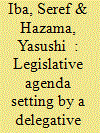

|
|
|
|
|
| Summary/Abstract |
This article examines the political motives and legislative consequences of Turkish omnibus bills that propose to amend a large number of disparate, unrelated laws. The quantitative analysis reveals, first, that the government uses omnibus bills to covertly change existing laws by attaching new articles to bills that are being deliberated. Second, undercover legislation backfires. The larger the number of current laws changed by an omnibus bill, the more likely those changes are to be annulled by the Constitutional Court. The legislative-efficiency objective behind omnibus bills is thus undermined by legal errors and deficiencies that result from a lack of parliamentary discussion.
|
|
|
|
|
|
|
|
|
|
|
|
|
|
|
|
| 7 |
ID:
152448


|
|
|
|
|
| Summary/Abstract |
The third-term policies of the AKP (Justice and Development Party) in Turkey posed new challenges for observers: do top-down Islamization policies and the increasing pan-Islamist tone in Turkish foreign policy signify a return to Islamism or is a new amalgamation in the making? In this case, is ‘post-Islamism’ now dated as an analytical tool to characterize the AKP’s new ideological formation or was it always a misnomer? Drawing on el-Affendi’s (2008) distinction between the Medina and Damascus models and observing the new Islamic opposition to the AKP policies, its post-2011 ideological configuration will be analyzed with reference to an antinomy of Islamism vs. Muslimism. Muslimism, an extension of Damascus model, is a quest for power and seeks Muslim interests worldwide. Islamism, an heir to Medina model, may be characterized by an ethical pursuit of justice that occasionally clashes with Muslim political interests.
|
|
|
|
|
|
|
|
|
|
|
|
|
|
|
|
| 8 |
ID:
152450
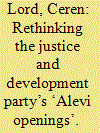

|
|
|
|
|
| Summary/Abstract |
The ‘Alevi openings’ launched in 2007 by the Justice and Development Party have been widely lauded as a historic and unprecedented step in the Turkish Republic. In contrast, this article places the ‘openings’ in a wider historical context, analyzing them in relation to processes of nation-building. Firstly, it is argued that the ‘openings’ marked continuity with previous interventions by state actors, including the military, dating back at least to the 1960s. Secondly, it is contended that these interventions should be regarded as a process of re-framing Alevism within a Turkish–Islamic framework, consigning it to ‘invisibility,’ rather than as democratization.
|
|
|
|
|
|
|
|
|
|
|
|
|
|
|
|
| 9 |
ID:
152455
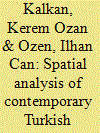

|
|
|
|
|
| Summary/Abstract |
This study offers a comprehensive approach to spatial analysis of parliamentary elections in Turkey since 2002. Using advanced spatial models, we find that electoral competitiveness and concentration mostly stabilized in the Western subprovinces whereas they are still in flux in the Eastern and Southern regions. There is an increasing level of geographically dependent concentration and competitiveness in recent elections, particularly in the 2015 elections (June and November). Our analyses also show that while the ruling AKP party has become the party of all regions, its competitors (CHP, MHP, and HDP) exhibit a narrowing geographical appeal.
|
|
|
|
|
|
|
|
|
|
|
|
|
|
|
|
|
|
|
|
|